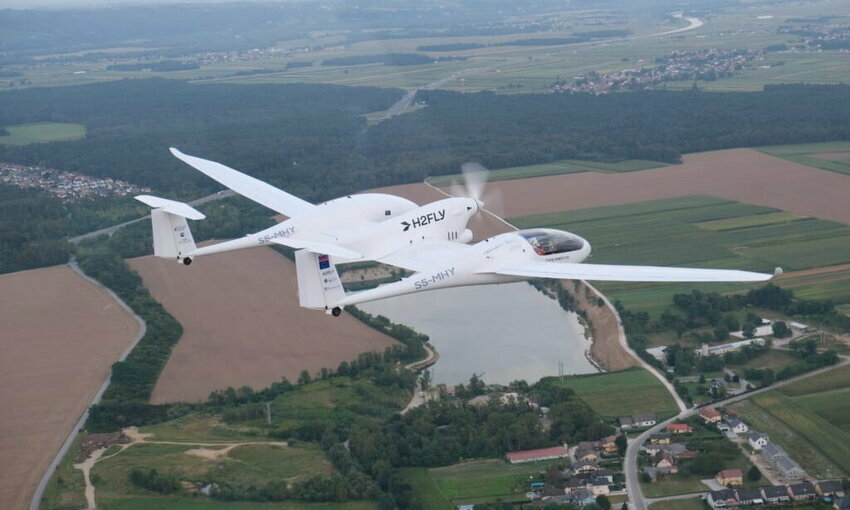 (Credit: H2FLY)
(Credit: H2FLY)H2FLY has completed the world’s first piloted flight of a hydrogen-powered electric aircraft, which allows for increased range in electric air travel.
Four test flights were completed by the company, including one flight that lasted over three hours.
The HY4 aircraft took off from Maribor, Slovenia, and was fitted with a hydrogen-electric fuel cell propulsion system along with cryogenically stored liquid hydrogen that powered the aircraft. H2FLY promotes the use of hydrogen to decarbonize air travel because it causes zero emissions, is safer than kerosene and synthetic fuels, and is economically viable. Now, the company claims the fuel enables regional air mobility connections because of its increased range in comparison to other zero and low-carbon fuels.
According to the test flights, using liquid hydrogen instead of gaseous hydrogen was able to double the maximum range of the aircraft from about 450 miles to about 930 miles.
“This achievement marks a watershed moment in the use of hydrogen to power aircraft,” said Professor Josef Kallo, co-founder of H2FLY. “Together with our partners, we have demonstrated the viability of liquid hydrogen to support medium and long-range emissions-free flight. We are now looking ahead to scaling up our technology for regional aircraft and other applications, beginning the critical mission of decarbonizing commercial aviation.”
The successful test flights mark the culmination of Project HEAVEN, a consortium supported by the European government aimed at demonstrating the feasibility of using liquid hydrogen to power aircraft. Partners from the consortium include Air Liquide, Pipstrel Vertical Solutions, the German Aerospace Center (DLR), EKPO Fuel Cell Technologies, and Fundación Ayesa.
In 2024, H2FLY plans to open its Hydrogen Aviation Center at Stuttgart Airport, providing fuel cell aircraft integration facilities and liquid hydrogen infrastructure. This development will bring the company further along its path towards commercializing its fuel systems and leading the way for hydrogen-powered aviation in Europe. H2FLY's H2F-175 system allows for full power range in altitudes up to 27,000 ft, enough for real-world commercial aircraft applications.
Sustainable aviation fuel (SAF) has already achieved commercial use but faces a number of challenges that hydrogen-fueled aviation may be able to respond to. For one, SAF is not completely emissions-free but instead lowers emissions of traditional aviation fuels by about 80%. Further, it is currently more expensive than conventional fuels. Hydrogen would be reportedly cheaper to implement than SAF, perhaps even cheaper than current, conventional aviation.
Hydrogen aviation, while not as far along as SAF, has gained attention as an effective alternative to fossil fuel-powered aviation and is expected to greatly contribute to the decarbonization of the sector in the years to come.